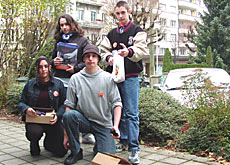Swiss extend help to Ukrainian street children

Ukraine has experienced strong economic growth since independence in 1991, but still faces a mountain of social problems inherited from the Soviet era.
Switzerland has been supporting the training of Ukrainian social workers who are on the frontline in the battle against poverty, Aids and other social issues.
Ukraine’s best side is reflected in the magnificent 19th century buildings lining the Primorsky Boulevard in Odessa, proudly overlooking the Black Sea.
The freshly painted edifices stand in stark contrast to the desolate Pioneer Park situated close by, right next to the famed Potemkin Stairs. It is in the empty park that Oleg, Igor and Sergey live – in a building that formerly housed an electricity transformer.
They are three of around 120,000 children who, according to Unicef, live on the streets in Ukraine. Many are orphans. Their families are among those that lost out following the break-up of the Soviet Union.
“Many parents were and still are forced to work in other countries. The children remain, in the best of cases, with a relative, but often they are left with a neighbour,” said Tatyana Bassyuk.
Bassyuk instructs social workers for the Child Well-being Fund Ukraine. The fund offers advanced training and operates seven resource centres in the country.
It is supported by the Swiss Agency for Development and Cooperation (SDC).
Critical period
There is a great demand for social workers and social pedagogues, as these professions are only as old as the country’s independence.
The social and economic changes brought about by the end of the Soviet Union resulted in huge social problems that the country struggled to deal with.
With Swiss help, the Child Well-being Fund brought over instructors to teach their Ukrainian counterparts. Universities did offer study courses in social work. “But even the lecturers were not familiar enough with the subject,” Bassyuk remarked.
The programme has now overcome the initial difficulties. The fund has 52 trainers who teach and give seminars around the country. “We are now trying to make this new knowledge as systematic and accessible as possible,” Bassyuk said. Seminar programmes are making the work of local social workers easier.
The SDC has earmarked SFr180,000 ($148,000) for this phase of the project. Ueli Müller, the agency’s representative in Kiev, is satisfied: “The project is coming to an end, and yet it is clear it will go on.”
In fact, the foundation is expected to operate without any support from the SDC in future.
Problems remain
Today, Ukrainian towns including Kiev, Lviv and Odessa are as European as Prague or Budapest. The strong economic performance has led to an increase in the number of the middle class. But many problems remain.
Natalya Trozenko, who runs the Child Well-being Fund resource centre on the outskirts of Kiev, sees around 400 to 500 social workers every month.
Trozenko has managed to cram more than 4,000 books on social issues into the centre, probably the biggest collection on the subject in Kiev.
She is also involved in the Way Back Home project in Odessa that looks after street children and offers them shelter.
Oleg, Igor and Sergey come here frequently during the day. Many of the children are drug dependent, injecting themselves with stimulants, which they can obtain easily from pharmacies. This is how Oleg became HIV positive.
swissinfo, adapted from an article in German by Erik Albrecht in Kiev and Odessa
According to UNAIDS, around 410,000 people are HIV positive in Ukraine. An estimated 22,000 people have died of the disease.
The per capita gross national income is SFr7,600 ($6,250).
There were no social workers in Ukraine prior to the collapse of the Soviet Union.
The Christian Children’s Fund was set up in 1997 to improve the living conditions of children and help them develop their full potential.
In August 2006, the name was changed to Child Well-being Fund Ukraine.
The fund has set up centres to support families and provide information, counselling and technical back-up to social workers and foster parents.

In compliance with the JTI standards
More: SWI swissinfo.ch certified by the Journalism Trust Initiative


You can find an overview of ongoing debates with our journalists here. Please join us!
If you want to start a conversation about a topic raised in this article or want to report factual errors, email us at english@swissinfo.ch.